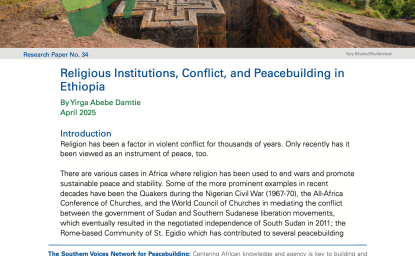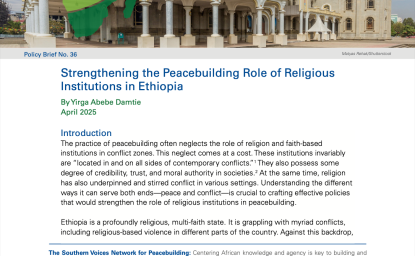K
enya received a prominent spotlight in US–Africa relations this year. President William Ruto’s May 2024 state visit marked the first time in 16 years that an African leader received an invitation for this celebration of bilateral relations. The visit to Washington came with a raft of funding commitments and partnerships and, notably, the designation of Kenya as a major non-NATO ally—the first in Sub-Saharan Africa.
The expanded partnership came under immediate scrutiny, however, as youth-led protests across Kenya were met with a violent police response less than a month after President Ruto’s trip. The protests responded to the 2024 Finance Bill but had their foundations in longstanding frustrations among Kenyans over the cost of living, government accountability, and corruption.
It is helpful to contextualize Kenya’s political challenges and these protests through a long-term lens. Kenya’s democracy is young. The country’s first true democratic elections were in 2002 with the election of President Mwai Kibaki. Then, following election-spurred violence in 2007 and 2008, the country inaugurated a new constitution. The current government structures are less than 15 years old.
New institutions are most vulnerable in these early years. As people engage with these institutions, the different sides jockey for power and influence. While, in many cases, the political tussles eventually subside and new institutions become accepted as the “rules of the game,” it can take up to a generation. In other cases, this competition can rupture into violent conflict as it did in Kenya in 2007 and 2008.
Taxation represents one of these fundamental rules of the game and a critical connection between citizens and their government. A closer correlation between a state’s revenue and citizen taxation creates stronger ties than when a government’s revenue comes, for example, from a commodity such as oil. However, corruption, perceived inequality, or frivolous spending all deeply harm the citizen–government relationship.
In Kenya, the Gen-Z protests responded to a government that is increasing taxes on a population that does not feel it is getting the appropriate value back. There is visible corruption across the country, and citizens regularly decry what they see as superfluous spending by politicians. On top of that, many citizens feel that their political processes lack genuine consultation and inclusion.
The Gen-Z protests are an important inflection point in Kenya’s citizen–state relations. How a government responds to these inflection points sets off on a path dependency that can be difficult to alter in the future. Limited responses that do not address structural concerns may provide short-term stopgaps but will ultimately fail to resolve increasing discontent and a fractured citizen–government relationship. With that perspective, the United States has an opportunity, particularly with the newly elevated non-NATO ally relationship, to play a constructive role that can help Kenya strengthen its democracy through experience sharing, engagement, and the promotion of transparent, inclusive, and accountable governance.
Author


Africa Program
The Africa Program works to address the most critical issues facing Africa and US-Africa relations, build mutually beneficial US-Africa relations, and enhance knowledge and understanding about Africa in the United States. The Program achieves its mission through in-depth research and analyses, public discussion, working groups, and briefings that bring together policymakers, practitioners, and subject matter experts to analyze and offer practical options for tackling key challenges in Africa and in US-Africa relations. Read more

Explore More
Browse Insights & Analysis
Religious Institutions, Conflict, and Peacebuilding in Ethiopia

Spying on Poachers

